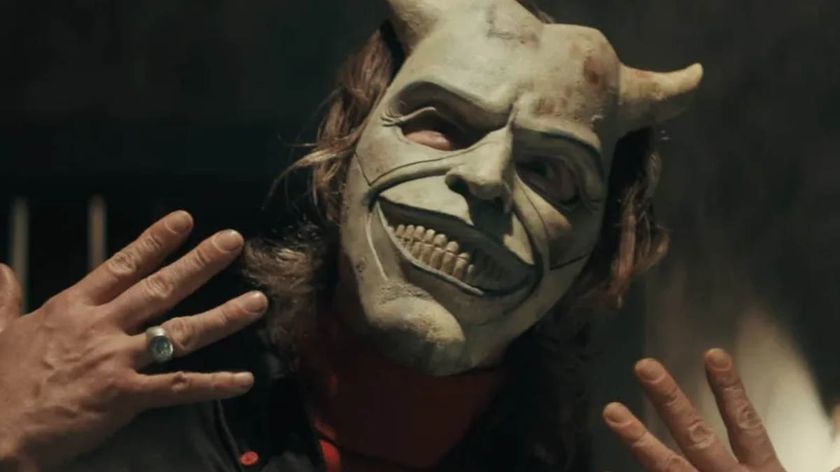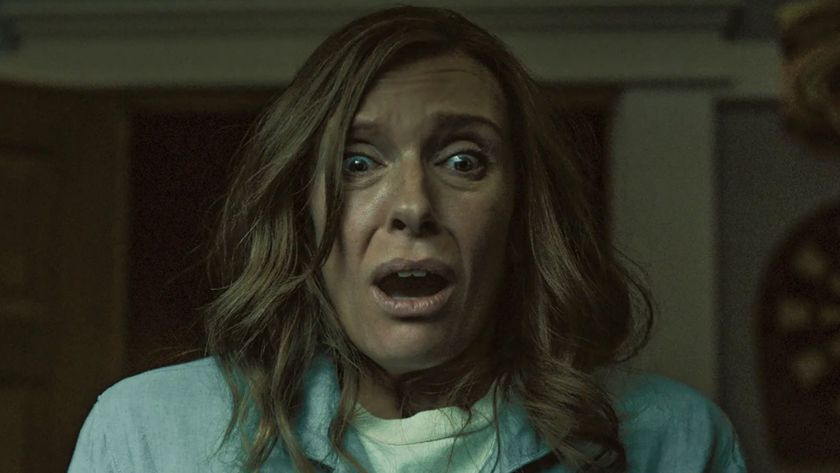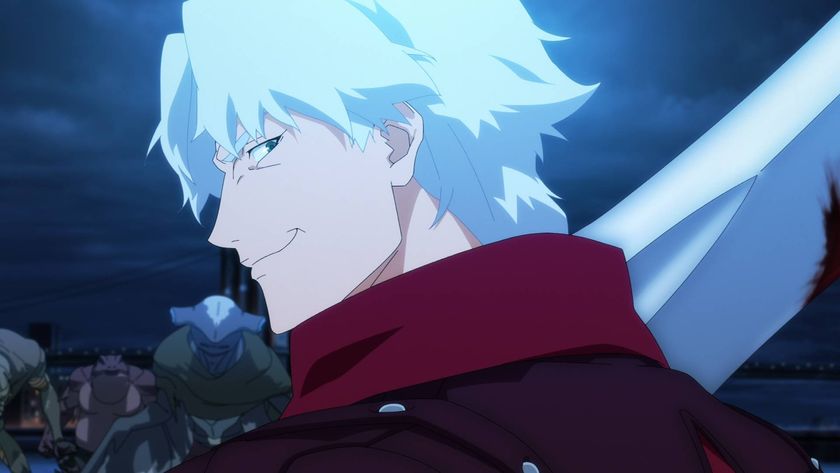The Boogeyman: Director Rob Savage on channelling childhood terror, adapting Stephen King, and creating the terrifying monster
EXCLUSIVE: We dive into the latest chilling Stephen King adaptation with director Rob Savage.
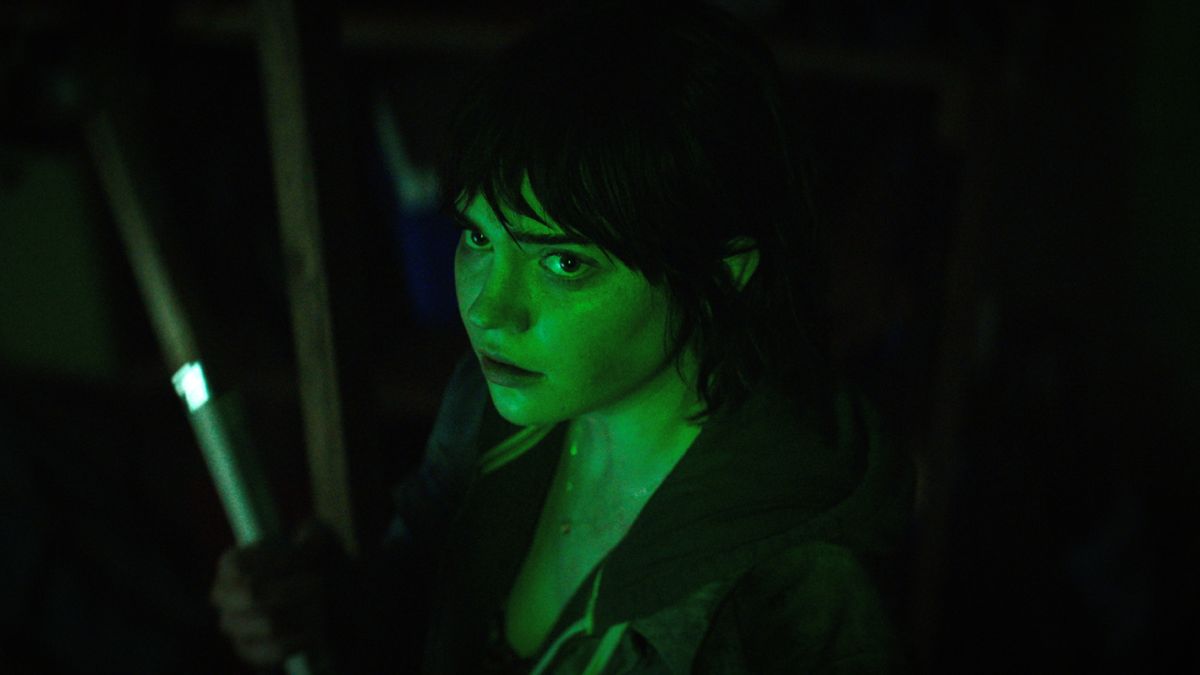
“It’s a story as old as time.” Director Rob Savage here isn’t misremembering the lyrics to the classic Beauty and the Beast song, instead he is describing the myth of the Boogeyman, the monster that lurks in the shadows, ready to feed on your fear. “It’s almost something that we know innately as children”, Savage tells us during our chat for the latest episode of the Inside Total Film podcast. “The Boogeyman lives in the dark spaces of your house – the closet or under the bed – and if you turn on your bedside lamp, you are then safe from the creature.”
The lore of the Boogeyman has been around for centuries, with historians tracing the legend back to as early as the 1500s. It has always existed, haunting us from the darkness, but the monster moved into the spotlight upon the publication of Stephen King’s short story, simply titled The Boogeyman, in the March 1973 issue of Cavalier magazine. That tale has now been brought to the big screen courtesy of director Savage (Host, Dashcam), who admits that given the long history of brilliant King adaptations, he was intimidated by the prospect of taking this one on: “I just tried not to think about it. We knew we wanted this to be a classy adaptation and stand shoulder-to-shoulder with the best ones, but rather than measure ourselves against De Palma [Carrie], Kubrick [The Shining], and these other great filmmakers, we just always went back to King’s writing which informed how we built out our story. Even the stuff we invented had to feel like it belonged in King’s body of work.”
Expanding King's story
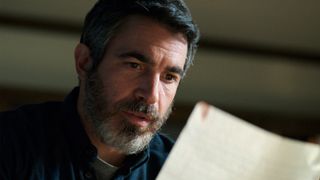
As Savage states, his feature significantly fleshes out King’s original story; something it had no choice but to do given that the source material is only a few pages long. The director tells us that this was actually the most daunting aspect of the filmmaking process, but thankfully the author gave the script the thumbs up: “I was the most anxious when we sent the script to King before shooting – we all know that he isn’t shy about voicing his opinions and I wanted to make sure he felt like we were building on the themes of his book, expanding upon it in a satisfying way. He loved the script, gave some great feedback, and as soon as we had that we felt like we were on a noble path with this movie, we could shoot it. But it is weird, most of this film is invention, the short story is pretty much contained within our first act, then it goes and becomes its own thing.”
As soon as we had that we felt like we were on a noble path with this movie
The opening scenes see a man named Lester Billings (David Dastmalchian) visit therapist Will Harper (Chris Messina), seeking help as he is being hunted by the Boogeyman. However, whilst the short story simply recounts Lester’s misfortunes, the film centers on the Harper family, seeing how this terrifying evil now turns its attention to Will and his two daughters - Sadie (Sophie Thatcher) and Sawyer (Vivien Lyra Blair). Writer duo Scott Beck and Bryan Woods (no strangers to horror having penned A Quiet Place) were responsible for this shift in focus, but when Savage came on board he made his own changes too. Wanting to recreate how he felt upon reading King’s story as a kid, the filmmaker decided that we should mostly see the events of the film through the children’s eyes: “Beck and Woods had done this draft that ended up being very different to the final film, it very much played in the world of Will and adults. I had read this story way too young, aged 11/12, and it messed me up completely to this day. I wanted to make audiences feel like I felt as a terrified little boy. Also, if you are doing a movie called The Boogeyman it had to be told from the perspective of the younger characters. The Boogeyman is the first name we give to the darkness that terrifies us as kids, so it felt like that was the way to attack it, reframing it to be about the Harper sisters.”
The catharsis of horror
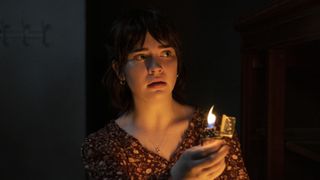
We pick up with Sadie and Sawyer as they mourn the recent tragic death of their mother, something dad Will is struggling to talk to them about. This is what draws the Boogeyman in, feeding off their festering wounds, threatening to further tear apart the already fracturing family. The more the Harpers avoid addressing how the tragedy has affected them, the stronger the monster becomes. The film therefore follows in the footsteps of other great movies such as The Descent and The Babadook, continuing the horror genre’s long exploration of grief. For Savage, the two go hand-in-hand: “I think that horror is almost one of the only genres in a mainstream space where you can speak to all these ugly things that no one wants to talk about. We all think about death, we ultimately lose everyone in our lives, we have to continually go through this process but we don’t like to talk about it and we certainly don’t like to put it up on the screen, staring us in the face. Except in horror movies, that is, as people have already signed that contract - they will go be confronted by something terrifying and that’s both things jumping out of closets and discussions of dark subject matter that in any other genre you wouldn’t accept. There is a catharsis about horror speaking to these taboo subjects that we otherwise wouldn’t talk about.”
There is a catharsis about horror speaking to these taboo subjects that we otherwise wouldn’t talk about
Making the movie itself was also healing for both Savage and star Messina, with the filmmaker revealing to us that they both drew inspiration from a deeply personal place: “I just lost somebody in my family before we started shooting and Chris had lost somebody close to him, too. We had these discussions about wanting to ensure those elements of grief felt real, emotional, and at home in a movie that was just a drama. We didn’t want them to feel like tropey horror film scenes, pandering, flippant, or obvious.”
Creating the monster
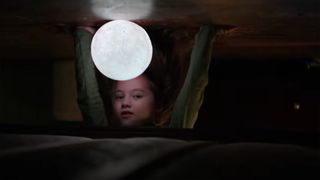
Something else that feels very real in the film is the Boogeyman itself, despite the fact it is a CGI creation. It’s a haunting design that will stick in your mind long after the credits have rolled, one you will see lurking in the dark shadows of your home when you have returned from the cinema. Savage knew that nailing the Boogeyman’s appearance would be absolutely critical, so he had a very clear manifesto regarding the design: “The idea was even when you see the full monster it reveals a hidden aspect of itself which is Lovecraftian and cosmically terrifying. That was our way of tipping our hat to the short story which ends with a skin-peeling twist. We wanted it to feel like this creature was the embodiment of our own mortality – this movie is about this family going through grief and not speaking about the loss they have gone through. So, this creature had to feel like this ancient thing that has been around since there was darkness, it has always existed there. You also had to be able to make this creature up out of human body parts - be able to break, burn, smush it together. It couldn’t be something that was alien with weird shapes that we didn’t recognise within ourselves. It had to be clean and simple too, something that could be reduced to a kid’s drawing.”
Sign up for the Total Film Newsletter
Bringing all the latest movie news, features, and reviews to your inbox
We wanted it to feel like this creature was the embodiment of our own mortality
Given that the Boogeyman is a monster that lives in the shadows, one of the few things it is afraid of is the light, something the Harpers begin to realize. Therefore the film plays around with the contrast between the light and the darkness, with the family weaponizing this in their fight against the creature. You may have noticed in the promotional material much emphasis has been placed on Sawyer’s moon shaped bedside lamp - and it’s for a good reason. As Savage tells us, he strived to use non-conventional lighting methods to bring new life to the darkness: “The Boogeyman is fundamentally a simple mythology so we wanted to be as inventive as possible with how we incorporated in light. So, with every single scene there is this battle between the light and the darkness, the characters are constantly trying to stave off the latter. We built the house to constantly have these cavernous areas of darkness where the creature could be lurking, so you are continually on edge. Something that I learnt from doing Host, when you put an open doorway behind a character you are constantly unnerved. We went through every single scare scene to find a new way to light it - so Sawyer with her moonball or flashes of video games, playing these familiar beats but in unfamiliar ways.”
Spontaneous scares
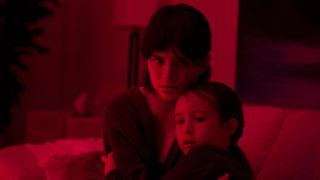
And that isn’t the only lesson Savage learnt from the making of his hit movie Host which he brought to The Boogeyman. Although both his previous features - Zoom séance Host and computer screen horror Dashcam - are unique in their presentation, while The Boogeyman takes a more traditional approach, Savage was keen to still tackle it in a similar manner, bringing in an element of improvisation: “Although The Boogeyman is ultimately a creature movie, a thing of flesh and blood, I treated it like a haunted house film so I was playing in the same ballpark as Host. But it was the fun spontaneity of those two movies that I tried to bring to this one. Host and Dashcam were improvised, shot off beat sheets, I workshopped the scenes with the actors to figure out what we were doing day-to-day. That’s not how we made The Boogeyman, Disney does not like to roll like that, and we had a much bigger budget. However, we could have just done exactly what was on the page and planned it all out in advance, but instead - and I wasn’t initially sure there would be room for this on a big studio movie - we played with scenes, improvised with them, rehearsed with the actors, there were scares that I could rewrite on the day as I would come up with a new idea. So, there was still that spontaneity and buzz that you get being on set and feeling like we aren’t just plodding through a plan - we are trying to make the best of every single scene.”
The witching hour
Now having made a film about the Boogeyman the question is, does Savage believe in the monster himself? He admits that at times he does: “I’m extremely sceptical about everything up until the point I’m in a really scary situation where I believe everything. I’ve been waking up at like 3am which is the witching hour. I’ll look at the clock and in that moment I believe in everything, the things lurking in the darkness. But then the bedside lamp goes on and I’m safe. 3am is when I believe in the Boogeyman.” That sounds to us like 3am is the perfect time to watch this movie then, for double Boogeymen trouble.
I’ll look at the clock and in that moment I believe in everything
King himself has, of course, already seen the film, with the team renting out the author’s favorite cinema in Maine to show him the feature before they locked in the final cut. Savage admits that he is relieved King “thankfully loved it”, adding that throughout production the writer has been the film’s biggest supporter: “He thought it was terrifying and sent this beautiful letter to us about how much he loved it, shouting out all the different departments and performances. He’s been so supportive but the weirdest thing is that I’ve been hearing through the grapevine that he’s been directly recommending it to people. I know that he called up Andy Muschietti [director of the It movies] telling him to see it. And Andy did, on King’s recommendation, also liking it. King has been spreading the word, who is absolutely the person you want to do that.”
And so - should you go see The Boogeyman? Well as Savage says the only person you need to listen to regarding this is the man himself - Stephen King.
The Boogeyman is in UK and US cinemas on 2 June. If you want to face more of your fears, we have got you covered with the best horror movies and Stephen King adaptations to watch. And don't forget to check out our interview with the film's star Chris Messina too.

As Entertainment Editor at GamesRadar, I oversee all the online content for Total Film and SFX magazine. Previously I've worked for the BBC, Zavvi, UNILAD, Yahoo, Digital Spy and more.
